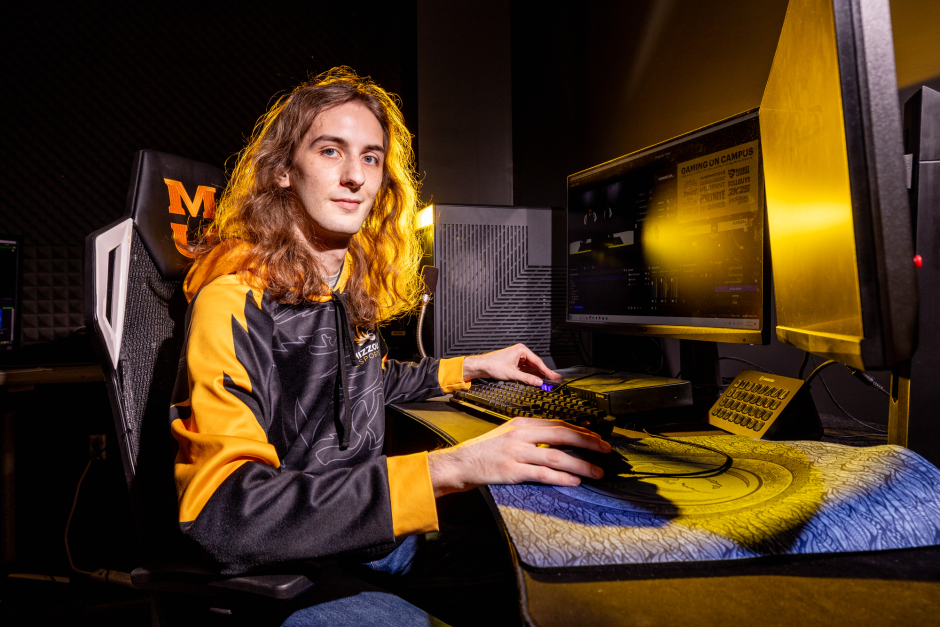
July 29, 2025
Contact: Cary Littlejohn, carylittlejohn@missouri.edu
Photo by Greta Cohoon
Jasper Holland’s father told him something he’s never forgotten.
“Computer programmers are modern-day wizards,” Holland said, recounting his father’s words. “You’re looking at all of these complex rules and creating things, sending tiny packets of lights to go do all these crazy things in the world.”
Those words led Holland, a Columbia native and Battle High School graduate, to the University of Missouri’s College of Engineering, where, in its Department of Electrical Engineering and Computer Science, he and fellow classmates are leveraging Mizzou advantages to chase a magical dream of their own: becoming game designers and business owners.
Rolling into business
This entrepreneurial story begins with Mizzou Engineering’s TigerHacks, the university’s largest hackathon — a weekend where computer programmers gather to code websites, games or other software, all based on a particular theme.
During Holland’s freshman year, he partnered with classmate Sam Hirner to compete. Mizzou made that partnership happen: The duo, both Honors College students, met as residents of Mark Twain Hall.
That year, the hackathon theme was transportation. While brainstorming in a study room, they rolled in office chairs to write on a dry-erase board. Then it hit them: What if the chairs were the inspiration they’d been looking for all along?
And just like that, the video game “Out of Cont-Roll” was born.
“You’re an office worker,” Holland, now a senior, said, describing the concept of the game. “In this office, there’s this extensive network of rolling chair racing.”
They added lifelike sound effects by going to Naka Hall and recording the sound of chairs rolling through empty halls.
“It’s very physics-based,” Holland said. “You move around with your mouse to swivel your chair and then you click to kick off and try to navigate through all these different office landscapes and get the fastest time to beat the computer-controlled office workers.”
They won first place in the gaming category and an overall crowd-favorite award.
It was the catalyzing event that put the idea of a video-game company in their heads.
“It wasn’t necessarily our only ambition coming into school, but after having done it and seeing the entire process in a weekend, quite rapidly, we thought, ‘Yeah, we really love doing this,’” Holland said.
Gaming wizards
Once they hatched the idea to form a business, the duo needed to round out their team. Mizzou had already provided the perfect addition: Honor Christensen.
Christensen and Holland met during another unique Mizzou experience. They were both members of the 2020 class of the Missouri Scholars Academy. Hosted by the Honors College, the academy has welcomed Missouri’s most academically gifted rising high school juniors to campus for the past 40 years.
The group wasted no time in making the idea a reality. After kicking around a few options, they landed on a company name that perfectly encapsulated the trio.
Weird Mage, their newly formed limited liability corporation, is a “creative studio,” Holland said.
“It fits us well,” Holland said, referring to the name. “We all really enjoy the fantasy elements, and when I think of being creative, I think of it as magic.”
They don’t want to put limits on what the company might offer in the future, which they hope will include gaming products more broadly, including tabletop games. But for now, the focus is on video-game development and organic marketing.
Holland hopes the magic will extend to video creation, as the partners try to produce captivating behind-the-scenes content that will document their creative process.
“We’re making games already, but if we can make really well-put-together videos about those processes that are entertaining in their own right, not only does that get people interested in the products we’re making, but those videos can be a product people want to come back and watch,” Holland said.
Mizzou's magical method
Mizzou has been instrumental to Weird Mage’s genesis. Beyond the unique experiences that led Holland to his business partners, the university is also playing a key role in the company’s early financial viability.
Holland isn’t merely a student in the Honors College; he’s a Stamps Scholar, one of five recipients of Mizzou’s premier scholarship for the Class of 2026.
Stamps Scholars receive a four-year, full scholarship, plus an additional $16,000 enrichment fund to be used during the student’s four years to enhance their studies and academic pursuits. Holland has used his enrichment funds for study abroad opportunities and is using some of them for this project.
“I wrote a proposal, and they approved the use of the rest of my enrichment funds as sort of a stipend for me to be able to work on Weird Mage full time over the summer,” Holland said. “I don’t have to worry about getting a part-time job or anything to supplement that.”
With that freedom, he’s dedicating his efforts to exploring different game engines and honing his video production skills.
Holland attributes many of the skills he’s developed to Mizzou’s varied programs and offerings, taking advantage of not just computer science courses but also those in its Department of Engineering and Information Technology and digital storytelling courses in the College of Arts and Science’s School of Visual Studies.
The greatest benefit boils down to the Missouri Method — learning by doing.
“Oftentimes, in these creative endeavors, actually doing the thing is the best way to learn and get better,” Holland said.
Extracurricular opportunities, such as Holland’s participation with Mizzou Esports broadcast team, have also provided him with exposure to different aspects of the gaming industry and additional technical skills developed through programming tasks.
He also credits the Robert J. Trulaske, Sr. College of Business as being a great resource for “entrepreneurs of all sorts, not just game developers.”
“There are a lot of programs for start-ups and entrepreneurship,” Holland said. “They seem really valuable. Some give you training and mentorship. Others are like competitions where you can win funding.”
Holland and company know the gaming industry is a competitive one, made even more so because it’s become more accessible to independent developers like them.
“If it ends up not working out as a full-time thing, we can pivot to a less-involved, part-time model, but it’s definitely not going to work to go full time if we don’t try it right now,” Holland said. “We have the ability to invest all of our time and energy into it right now, thanks to being students at Mizzou.”



